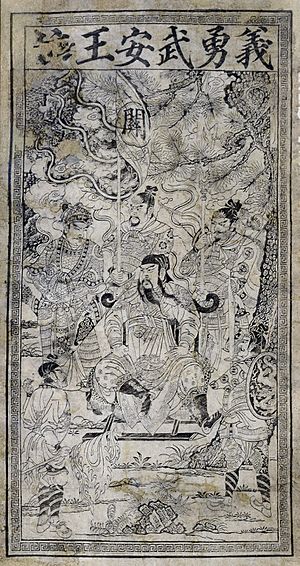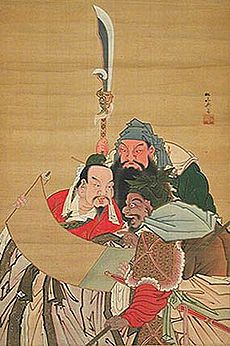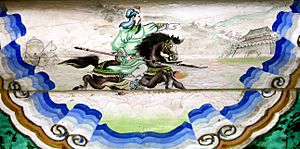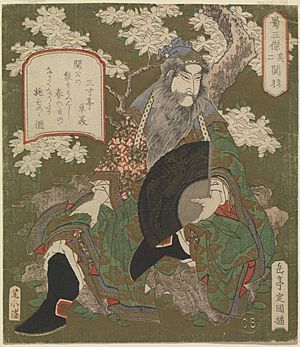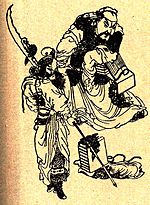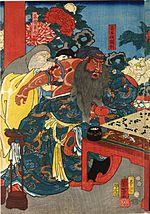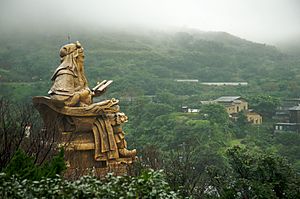Guan Yu facts for kids
Quick facts for kids
Guan Yu
|
|
|---|---|
| 關羽 | |
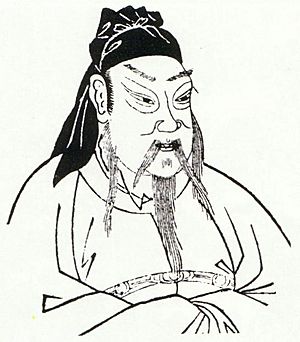
A portrait of Guan Yu in the Sancai Tuhui
|
|
| General of the Vanguard (前將軍) | |
| In office 219–220 |
|
| Monarch | Liu Bei (King of Hanzhong) / Emperor Xian (Han dynasty) |
| General Who Defeats Bandits (盪寇將軍) (under Liu Bei) |
|
| In office c. 211–219 |
|
| Monarch | Emperor Xian of Han |
| Administrator of Xiangyang (襄陽太守) (under Liu Bei) |
|
| In office c. 211–219 |
|
| Monarch | Emperor Xian of Han |
| Lieutenant-General (偏將軍) (under Cao Cao, then Liu Bei) |
|
| In office 200 – c. 211 |
|
| Monarch | Emperor Xian of Han |
| Personal details | |
| Born | Unknown Xie County, Hedong Commandery, Han Empire (present-day Yuncheng, Shanxi) |
| Died | January or February 220 Linju County, Xiangyang Commandery, Han Empire (present-day Nanzhang County, Hubei) |
| Children |
|
| Occupation | General |
| Courtesy name | Yúncháng (雲長) |
| Posthumous name | Marquis Zhuàngmóu (壯繆侯) |
| Peerage | Marquis of Hànshòu Village (漢壽亭侯) |
| Deity names |
|
| Other names |
|
| Guan Yu | |||||||||||||||||||||||||||||||||
|---|---|---|---|---|---|---|---|---|---|---|---|---|---|---|---|---|---|---|---|---|---|---|---|---|---|---|---|---|---|---|---|---|---|

Guan's name in Traditional (top) and Simplified (bottom) Chinese characters
|
|||||||||||||||||||||||||||||||||
| Traditional Chinese | 關羽 | ||||||||||||||||||||||||||||||||
| Simplified Chinese | 关羽 | ||||||||||||||||||||||||||||||||
|
|||||||||||||||||||||||||||||||||
Guan Yu was a famous Chinese general. He lived during the late Han dynasty in China. He was a brave soldier who served a warlord named Liu Bei. Guan Yu was like a brother to Liu Bei and Zhang Fei. They went on many adventures together.
Guan Yu helped Liu Bei create his own state, Shu Han. This happened during the Three Kingdoms period. People remember Guan Yu for his great loyalty to Liu Bei. He also showed kindness to Cao Cao by defeating Cao Cao's enemy, Yan Liang. This happened at the Battle of Boma.
Later, Guan Yu stayed in Jing Province to protect it for Liu Bei. This was for about seven years. In 219, he was fighting Cao Cao's army at the Battle of Fancheng. While he was away, Liu Bei's friend, Sun Quan, broke their alliance. Sun Quan sent his general Lü Meng to take over Jing Province. Guan Yu found out about this after his defeat at Fancheng. But it was too late. Sun Quan's soldiers captured and executed him.
After his death, Guan Yu became a legendary hero. People told many stories about his life. He was even seen as a god during the Sui dynasty. A famous novel, Romance of the Three Kingdoms, made his deeds even more popular. Guan Yu is now a symbol of loyalty and fairness in East Asia. Many Chinese people still worship him today. They call him "Emperor Guan" (Guān Dì) or "Lord Guan" (Guān Gōng). You can find small shrines to him in many Chinese shops and restaurants.
Contents
- Guan Yu's Appearance and Weapon
- Early Life and Joining Liu Bei
- Serving Under Cao Cao Briefly
- Reuniting with Liu Bei
- Battles and Guarding Jing Province
- The Battle of Fancheng
- Losing Jing Province and Death
- Guan Yu's Capture and Execution
- Guan Yu's Family
- Guan Yu's Reputation
- Guan Yu in Romance of the Three Kingdoms
- Worship of Guan Yu
- Images for kids
- See also
Guan Yu's Appearance and Weapon
Historical records don't describe Guan Yu's exact look. But one famous person, Zhuge Liang, said Guan Yu had a "peerless beard." This means his beard was incredibly impressive.
People usually imagine Guan Yu with a red face and a long, thick beard. His red face might come from old Chinese operas. In operas, red faces often show loyalty and fairness. In drawings from Romance of the Three Kingdoms, Guan Yu usually wears a green robe over his armor.
Guan Yu's famous weapon was a guan dao. It was called the Green Dragon Crescent Blade. This weapon looked like a long pole with a blade on the end. It was said to weigh about 49.2 kilograms (108 pounds). That's super heavy!
Early Life and Joining Liu Bei
Guan Yu came from a place called Xie County. This is in modern-day Yuncheng, Shanxi. His first courtesy name was Changsheng. He loved to study and knew a lot about the ancient history book Zuo zhuan. He could even recite parts of it.
He left his hometown for reasons we don't know. He then went to Zhuo Commandery. In the 180s, a big rebellion called the Yellow Turban Rebellion started. Guan Yu and Zhang Fei joined a group of volunteers. This group was led by Liu Bei. They helped a colonel named Zou Jing stop the rebels. Guan Yu and Zhang Fei were known as very strong and brave fighters.
When Liu Bei became the Minister of Pingyuan, Guan Yu and Zhang Fei became Majors. They each led groups of soldiers under Liu Bei. Liu Bei treated them like his own brothers. They were so close they shared rooms, slept on the same mat, and ate together. Guan Yu and Zhang Fei always protected Liu Bei. They stood guard for him and were ready for any danger. People said they were "enemies of ten-thousand" because of their fighting skills. Guan Yu was kind to his soldiers and very loyal to Liu Bei. But he wasn't always polite to important officials.
Serving Under Cao Cao Briefly
Joining Cao Cao's Forces
Liu Bei and his men followed Cao Cao to the capital city, Xu. This was after they won a battle against Lü Bu in 198. About a year later, Liu Bei and his group left Xu. They pretended to help Cao Cao attack Yuan Shu. Liu Bei went to Xu Province, killed an official, and took control. He then moved to Xiaopei and left Guan Yu in charge of the capital, Xiapi.
In 200, Cao Cao attacked Liu Bei and won. Liu Bei ran away to northern China and found safety with Cao Cao's enemy, Yuan Shao. Guan Yu was captured by Cao Cao's army and taken back to Xu. Cao Cao treated Guan Yu with great respect. He even asked the emperor to make Guan Yu a Lieutenant-General.
The Battle of Boma
Later that year, Yuan Shao sent his general Yan Liang to attack Cao Cao's army at Boma. Cao Cao sent Zhang Liao and Guan Yu to fight them. During the battle, Guan Yu saw Yan Liang's special umbrella. He bravely charged towards Yan Liang and killed him. Yan Liang's soldiers couldn't stop Guan Yu. With Yan Liang dead, the attack on Boma ended. Because of Guan Yu's bravery, the emperor gave him the title "Marquis of Hanshou Village."
Guan Yu Leaves Cao Cao
Cao Cao admired Guan Yu's character. But he knew Guan Yu wouldn't stay with him forever. Cao Cao asked Zhang Liao to talk to Guan Yu. Guan Yu told Zhang Liao that he was grateful to Cao Cao. However, he had promised to follow Liu Bei until he died. He said he couldn't break his promise and would leave soon.
Zhang Liao told Cao Cao this. Cao Cao was even more impressed. He said, "A soldier who serves his lord but doesn't forget his old friends is truly a good person." After Guan Yu helped lift the siege on Baima, Cao Cao knew he would leave. So, he gave Guan Yu many gifts. Guan Yu sealed up all the gifts. He wrote a goodbye letter and went to find Liu Bei. Cao Cao's officers wanted to chase Guan Yu. But Cao Cao stopped them. He said, "He is just doing his duty to his lord. There's no need to chase him." This showed how generous Cao Cao was.
Reuniting with Liu Bei
In 200, Cao Cao and Yuan Shao fought at the Battle of Guandu. Yuan Shao sent Liu Bei to help a rebel leader named Liu Pi. Their goal was to attack the capital city, Xu. Guan Yu met up with Liu Bei around this time. But Cao Cao's general, Cao Ren, defeated Liu Bei and Liu Pi. Liu Bei then went back to Yuan Shao.
Liu Bei secretly planned to leave Yuan Shao. He pretended to suggest that Yuan Shao team up with Liu Biao. Liu Biao was the governor of Jing Province. Yuan Shao sent Liu Bei to another rebel leader, Gong Du. They gathered thousands of soldiers. Cao Cao defeated Yuan Shao and then attacked Liu Bei again. Liu Bei fled south and found safety with Liu Biao. Liu Biao put Liu Bei in charge of Xinye. Guan Yu followed Liu Bei to Xinye.
Battles and Guarding Jing Province
The Battle of Red Cliffs
In 208, Liu Biao died. His younger son, Liu Cong, took over. Liu Cong surrendered Jing Province to Cao Cao. Cao Cao was trying to take over southern China. Liu Bei and his followers left Xinye. They headed towards Xiakou, which was safe with Liu Biao's older son, Liu Qi. Liu Bei split his group into two. Guan Yu led one group by river to Jiangling. Liu Bei led the other group by land.
Cao Cao sent 5,000 fast horsemen to chase Liu Bei. They caught up at Changban, where a battle happened. Liu Bei and his remaining followers escaped. They reached Han Ford, where Guan Yu's group picked them up. They sailed to Xiakou together. In 208, Liu Bei teamed up with Sun Quan. They defeated Cao Cao at the big Battle of Red Cliffs. Cao Cao went back north. He left Cao Ren to defend Jing Province.
Guarding Jing Province
During the Battle of Jiangling, Guan Yu blocked Cao Ren's supply routes. Other generals like Xu Huang and Yue Jin also fought Guan Yu. After Liu Bei took control of southern Jing Province, he made Guan Yu the Administrator of Xiangyang. Guan Yu also became the General Who Defeats Bandits. He was ordered to stay north of the Yangtze River.
Between 212 and 214, Liu Bei began a campaign to take over Yi Province. Most of Liu Bei's officers joined him. But Guan Yu stayed behind to protect Liu Bei's lands in Jing Province.
Land Dispute with Sun Quan
In the mid-210s, Liu Bei and Sun Quan had a disagreement over land. Liu Bei had "borrowed" southern Jing Province from Sun Quan. He was supposed to return it after finding another base. After Liu Bei took Yi Province, Sun Quan asked for three commanderies back. But Liu Bei refused. Sun Quan then sent his general Lü Meng to take the lands by force. Liu Bei ordered Guan Yu to stop Lü Meng.
Lu Su, Sun Quan's commander, invited Guan Yu to a meeting to solve the problem. Around 215, Liu Bei made peace with Sun Quan. They agreed to divide southern Jing Province along the Xiang River. Both sides then pulled back their armies.
The Battle of Fancheng
In 219, Liu Bei won the Hanzhong Campaign against Cao Cao. After this, Liu Bei called himself "King of Hanzhong." He made Guan Yu the General of the Vanguard. In the same year, Guan Yu attacked Cao Ren at Fancheng and surrounded the fortress. Cao Cao sent Yu Jin with more soldiers to help Cao Ren. It was autumn, and heavy rains caused the Han River to flood. The flood destroyed Yu Jin's armies. Yu Jin surrendered to Guan Yu. But his officer Pang De refused and was executed by Guan Yu.
Many local officials and rebels joined Guan Yu. Guan Yu's fame spread all over China. The Shu Ji historical record says Guan Yu had a dream before this battle. He dreamt a boar bit his foot. He told his son Guan Ping, "I am getting weaker this year. I might not come back alive."
Sun Quan's Anger
With Liu Bei gaining Hanzhong and Guan Yu winning, Cao Cao thought about moving his capital. He wanted to avoid Guan Yu. But Sima Yi and Jiang Ji told him that Sun Quan would be upset by Guan Yu's victory. They suggested Cao Cao team up with Sun Quan. They thought Sun Quan could help stop Guan Yu. In return, Cao Cao would accept Sun Quan's control over his lands. Cao Cao agreed.
Before this, Sun Quan had asked Guan Yu if his son could marry Guan Yu's daughter. But Guan Yu not only said no, he also insulted Sun Quan's messenger. Sun Quan was very angry about this.
Xu Huang's Counterattack
Cao Cao later sent Xu Huang to help Cao Ren at Fancheng. Xu Huang broke through Guan Yu's defenses. He defeated Guan Yu's forces, which ended the siege on Fancheng. Guan Yu pulled back his soldiers because he couldn't capture Fancheng.
The Shu Ji tells a story about Xu Huang meeting Guan Yu. Xu Huang and Guan Yu used to be close friends. They often talked about things other than war. When they met at Fancheng, Xu Huang ordered his men: "Whoever captures Guan Yu's head will get 1,000 jin of gold!" Guan Yu was shocked and asked, "Brother, what are you saying?" Xu Huang replied, "This is a matter of the state."
Losing Jing Province and Death
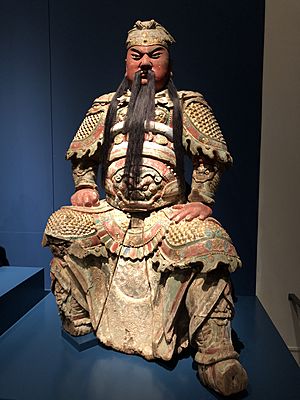
Guan Yu had defeated Yu Jin at Fancheng. But his army was running out of food. So, he took grain from one of Sun Quan's storage places. By this time, Sun Quan had secretly agreed to work with Cao Cao. Sun Quan sent Lü Meng and others to invade Jing Province. Sun Quan followed with more soldiers. Lü Meng's troops hid in boats that looked like civilian ships. They sailed towards Jing Province. Lü Meng secretly disabled Guan Yu's watchtowers along the river. So Guan Yu didn't know about the invasion.
When Guan Yu went to Fancheng, he left Mi Fang and Shi Ren to guard his main bases. These were Nan Commandery and Gong'an. Guan Yu had often treated them badly. During the Fancheng campaign, Mi Fang and Shi Ren sent too few supplies to Guan Yu's army. Guan Yu was annoyed and said he would deal with them later. Mi Fang and Shi Ren felt worried about this. When Sun Quan invaded Jing Province, Lü Meng was kind to Mi Fang. He convinced Mi Fang to surrender. Yu Fan also persuaded Shi Ren to give up. Most of Liu Bei's lands in Jing Province then fell to Sun Quan.
Guan Yu's Capture and Execution
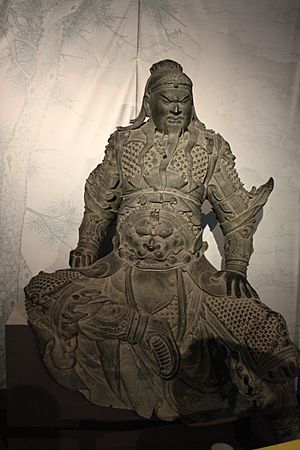
When Guan Yu retreated from Fancheng, Sun Quan's forces had already taken Jiangling. They also captured the families of Guan Yu's soldiers. Lü Meng ordered his troops to treat the civilians well. Most of Guan Yu's soldiers lost their will to fight. They left the army to go back to Jing Province and be with their families.
Guan Yu knew he was alone. He went to Maicheng and then headed west. His remaining men also left him and surrendered to the enemy. Sun Quan sent Zhu Ran and Pan Zhang to block Guan Yu's escape. Guan Yu, his son Guan Ping, and his officer Zhao Lei were captured alive. This happened in an ambush by Pan Zhang's deputy, Ma Zhong. Guan Yu and Guan Ping were later executed by Sun Quan's forces.
After His Death
Sun Quan sent Guan Yu's head to Cao Cao. Cao Cao gave Guan Yu a noble funeral. He buried Guan Yu's head with full honors. Later, in 260, Liu Shan gave Guan Yu the special title "Marquis Zhuangmou."
Guan Yu's Family
Guan Yu had two known sons: Guan Ping and Guan Xing. Guan Xing inherited his father's title, "Marquis of Hanshou Village." He served in the state of Shu Han during the Three Kingdoms period. Guan Yu also had a daughter. Sun Quan once suggested his son marry Guan Yu's daughter. But Guan Yu refused. Her name is not in history books. But in stories and operas, she is called "Guan Yinping" or "Guan Feng."
Guan Xing's son, Guan Tong, married one of Liu Shan's daughters. He served in the imperial guards. Guan Tong had no son when he died. So, his younger half-brother, Guan Yi, took his place. After the fall of Shu in 263, Pang Hui, who was Pang De's son, killed Guan Yu's family. He did this to get revenge for his father, whom Guan Yu had executed.
Guan Yu's Reputation
Chen Shou, who wrote about Guan Yu, said he and Zhang Fei were "mighty warriors." They were like "tigers" among Liu Bei's men. Guan Yu was known for being kind to his soldiers. He was also very loyal to Liu Bei. But he could be stubborn and proud.
Both Guan Yu and Zhang Fei were famous during their lives as great fighters. Important officials from other kingdoms called them "warriors who are a match for ten thousand men." This means they were incredibly strong. This phrase is still used in Chinese culture today. It describes someone with amazing strength.
Historian Rafe de Crespigny said Guan Yu was harsh to important officials. But he treated his soldiers well. Both Guan Yu and Zhang Fei were seen as the best fighters of their time.
Guan Yu in Romance of the Three Kingdoms
The 14th-century novel Romance of the Three Kingdoms makes Guan Yu even more famous. It shows him as a very fair and loyal warrior. The novel changed and exaggerated many parts of his story. This is why he is so popular in Chinese culture.
Here are some famous stories about Guan Yu from the novel:
- Oath of the Peach Garden: Where he, Liu Bei, and Zhang Fei became sworn brothers.
- Battle of Hulao Pass: Where he showed his amazing fighting skills.
- List of fictitious stories in Romance of the Three Kingdoms#Guan Yu slays Yan Liang and Wen Chou: Where he defeated two strong generals.
- List of fictitious stories in Romance of the Three Kingdoms#Guan Yu crosses five passes and slays six generals: A famous journey where he fought his way through many checkpoints.
- List of fictitious stories in Romance of the Three Kingdoms#Guan Yu releases Cao Cao at Huarong Trail: Where he let Cao Cao escape.
- List of fictitious stories in Romance of the Three Kingdoms#Hua Tuo heals Guan Yu's arm: A story about a doctor healing his arm.
Worship of Guan Yu
Guan Yu became a god as early as the Sui dynasty (581–618). Today, many people still worship him. Buddhists see him as a bodhisattva, a protector of their faith. In Chinese folk religion and Taoism, he is a guardian god. He is also highly respected in Confucianism.
In Chinese Religion
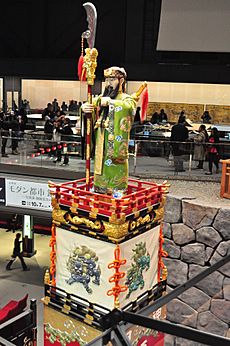
In Chinese folk religion, Guan Yu is often called "Emperor Guan" (Guāndì) or "Lord Guan" (Guān Gōng). His Taoist title is "Holy Emperor Lord Guan." You can find temples and shrines just for Guan Yu all over China and in places with Chinese influence. Some temples, like the Guandi Temple in Xiezhou, are built like royal palaces. This shows his high status as a "ruler."
How He Became a God
Guan Yu became a god over time. He was given higher and higher titles after his death. Liu Shan, the second emperor of Shu, gave him the title "Marquis Zhuangmou." During the Song Dynasty, Emperor Huizong gave him the title "Duke Zhonghui," and later a prince's title. In 1187, Emperor Xiaozong honored him as "Prince Zhuangmou Yiyong Wu'an Yingji." Later emperors also gave him grand titles.
In 1614, the Wanli Emperor gave Guan Yu a very long title. It meant "Holy Emperor Guan, the Great God Who Subdues Demons in the Three Worlds and Whose Awe Spreads Far and Moves Heaven." During the Qing dynasty, the Shunzhi Emperor called him "Guan, the Loyal and Righteous God of War, the Holy Great Deity." This title grew even longer over time. He is often called "Saint of War," which is as important as Confucius, the "Saint of Culture."
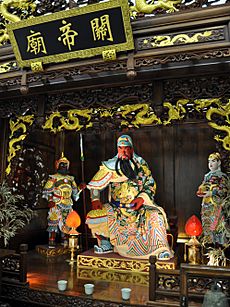
Throughout history, people believed Guan Yu helped in many military victories. In the 14th century, his spirit was said to have helped Zhu Yuanzhang, who started the Ming dynasty. In 1402, when Zhu Di took over the throne, he claimed Guan Yu's spirit blessed him. In the late 1500s, Guan Yu was also believed to have helped stop the Japanese invasion of Korea.
Worship Today
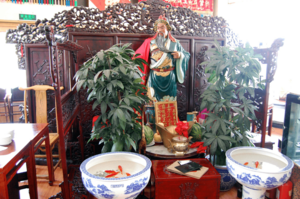
Today, many Chinese people still worship Guan Yu. You can find his shrines in homes, businesses, and temples. In Hong Kong, every police station has a shrine to Guan Yu. Police officers worship him, though it's not required. Interestingly, members of secret societies like the triads also worship Guan Yu. Triad statues of Guan Yu usually hold his weapon in the left hand. Police statues hold it in the right hand. This shows which side is worshipping him.
In Hong Kong, Guan Yu is sometimes called "Yi Gor," meaning "second elder brother." This is because he was second to Liu Bei in their fictional brotherhood. Chinese business people also worship Guan Yu. They see him as a god of wealth. They believe he blesses honest people and protects them.
Guan Yu is also used as a door god in Chinese temples. Pictures of him are put on doors to keep away evil spirits. He is often paired with Zhang Fei or Guan Ping. There are huge statues of Guan Yu in China, like the 58-meter tall one in Jingzhou City.
In Taoism
In Taoism, Guan Yu is called "Holy Ruler Deity Guan." He is seen as a powerful helper against demons. Taoist worship of Guan Yu started during the Song Dynasty. A legend says that in the 12th century, a salt lake stopped producing salt. The emperor asked a Taoist master to find out why. The master said it was the work of Chi You, a war god. The master then asked Guan Yu for help. Guan Yu fought Chi You and won. After that, the lake started producing salt again. The emperor then gave Guan Yu the title "Immortal of Chongning." This officially made him a god in Taoism.
Today, Taoist practices are very common in Guan Yu worship. Many temples dedicated to him show strong Taoist influences. Every year, on the 24th day of the sixth month of the lunar calendar (Guan Yu's birthday), there is a big parade in his honor.
In Buddhism
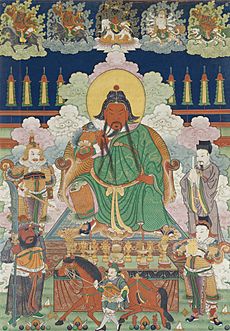
In Chinese Buddhism, many Buddhists see Guan Yu as Sangharama Bodhisattva. This means he is a heavenly protector of Buddhist teachings. "Sangharama" means 'monastery' in Sanskrit. It also refers to gods and spirits who guard Buddhist monasteries and the faith. Over time, Guan Yu became the guardian of temples and their grounds. His statue is often on the left side of the main altar, opposite Skanda.
Buddhist legends say that in 592, Guan Yu appeared to the Chan master Zhiyi. Zhiyi was meditating when Guan Yu appeared with other spirits. Guan Yu asked the master to teach him about Buddhism. After learning, Guan Yu promised to protect temples and Buddhist teachings. Legends also say Guan Yu helped Zhiyi build the Yuquan Temple, which still stands today.
Famous Guandi Temples Around the World
- Dongmyo in Seoul, South Korea (built in 1601)
- Miếu Quan Công in Hoi An, Vietnam (built in 1653)
- State Temple of the Martial God in Tainan, Taiwan (built in 1663)
- Kuan Tai Temple (Sam Kai Vui Kun) in Macau (built in 1750)
- Gong Wu Shrine, in Bangkok, Thailand
- Kwan Sing Bio Temple in Tuban, Indonesia (built in 1773)
- Hội quán Nghĩa An in Ho Chi Minh City, Vietnam (built in 1819)
- Temple of Kwan Tai in California, United States (built in 1854)
- Guandi Temple in Kuala Lumpur, Malaysia (built in 1887)
- Sze Yup Kwan Ti Temple in Glebe, Australia (built in 1898)
- Xingtian Temple in Taipei, Taiwan (built in 1967)
Images for kids
Error: no page names specified (help).
- Enzhugong
- Martial temple & Wen Wu temple
- Kwan Tai temples in Hong Kong
- Hip Tin temples in Hong Kong
- Holy Emperor Guan's True Scripture to Awaken the World
- Lists of people of the Three Kingdoms
- Statue of Guan Yu (Jingzhou)
See also
 In Spanish: Guan Yu para niños
In Spanish: Guan Yu para niños


